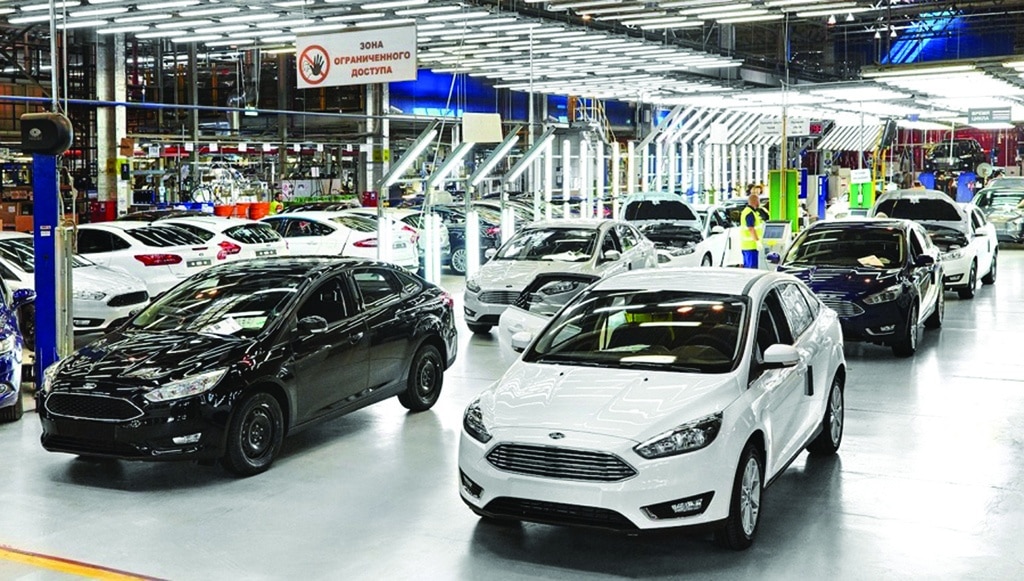MOSCOW: New car sales in Russia sank by 83.5 percent year-on-year in May, industry data showed on Monday, as the effects of unprecedented Western sanctions hit the country’s economy and consumers. Only 24,268 cars and light commercial vehicles were sold in Russia in May, said the Association of European Businesses in Moscow. The collapse is sales in May came after a 78.5 percent drop in April. Sales of the country’s most popular and affordable brand, Lada, whose AvtoVAZ manufacturer was majority-owned by the Nissan-Renault group, fell 84 percent to 6,000 units year-on-year.
The West slapped Russia with debilitating sanctions after the start of Moscow’s military campaign in Ukraine in February. In May, Renault handed over its local assets to the Russian government, marking the first major nationalization since the onset of sanctions. Renault controlled 68 percent of AvtoVAZ but was under pressure to pull out of the country. Numerous carmakers have stopped sales of their cars or parts to Russia including Audi, Honda, Jaguar and Porsche. Makes that have halted Russian production include BMW, Ford, Hyundai, Mercedes, Volkswagen and Volvo.
Last week the statistics service said the country’s industrial output shrank for the first time since the start of the military campaign, falling by 1.6 percent in April compared to the same period last year. Car production was hit particularly hard, falling by 85.4 percent year-on-year. Faced with a shortage of imported parts in factories, authorities eased safety and emission standards for locally produced cars in May-including dropping the requirement for airbags.
With billions of dollars in financial reserves and money still coming in from oil and gas exports, Russia has yet to feel the full impact of the barrage of Western sanctions imposed over its offensive in Ukraine. At his garage in the south of Moscow, 35-year-old mechanic Ivan is starting to worry. But Ivan sees storm clouds on the horizon. The foreign parts he needs to fix his clients’ cars are getting harder to find, and prices have jumped by at least 30 percent after many brands halted exports to Russia.
“We’re running out of stock. At some point, there won’t be anything left,” said Ivan, who declined to give his last name when speaking to international media. “People who have foreign cars are worried, they are wondering what to do in the future,” he said. Faced with a shortage of imported parts in factories, authorities eased safety and emission standards for locally produced cars in May-including dropping the requirement for airbags.
President Vladimir Putin has been defiant in the face of Western sanctions, insisting that the Russian economy will emerge stronger, and pointing to “chaotic measures” in Europe that have boosted global energy prices. Officials say the damage from sanctions will be temporary, with the economy expected to shrink by eight percent this year and then bounce back to growth in 2024.
But Russia is heavily reliant on imports of everything from manufacturing equipment to consumer goods, and economists believe the worst effects of the sanctions are still to come. Now almost 100 days into the conflict, officials and ordinary Russians are reporting a litany of problems, including shortages of everything from paper to medicine.
Authorities have stopped releasing key data, making it difficult to assess the impact of sanctions. But the few available economic indicators point to significant problems. Strict capital controls, high energy prices and a collapse in imports have led to a surge in the ruble, prompting Russia’s central bank to slash its key rate last week in a bid to rein in the currency.
Inflation meanwhile hit 17.8 percent year-on-year in April, the highest for 20 years. And revenues from domestic value-added or sales tax collapsed by more than a half in April, VAT fees on imported goods dropping by a third compared to the same month in 2021. “In April, the revenues of the overwhelming majority of companies in Russia took a hit,” Andrei Grachev, head of tax practice at Birch Legal, told The Bell, an independent Russian business website.
“This didn’t merely affect those who ceased operations in Russia, but also those who continued to work but lost clients and profits.” That hit is evident on the streets of Moscow, which are now lined with shuttered shops: from McDonald’s and Starbucks to clothing retailers H&M and Zara. Central bank chief Elvira Nabiullina warned in April that problems were emerging “in all sectors, both in large and small companies.” - AFP











